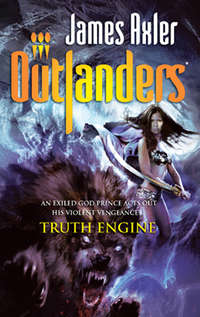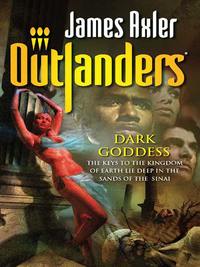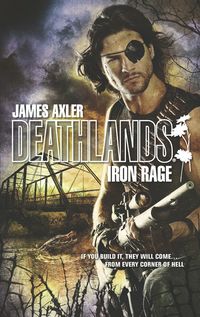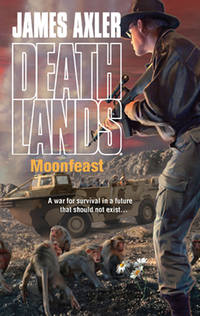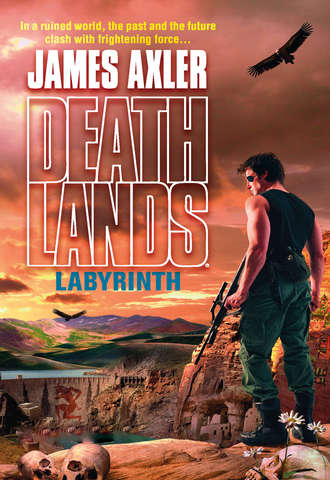
Полная версия
Labyrinth
“Give me your shirt,” Ewald said to the big man standing on Tolliver’s right.
Though they were the almost same height and weight, where Ewald was all muscle, Dunbar was all flab—a slope-shouldered blob. This morning’s sudden, shocking reversal of fortune had silenced his constant, annoying chatter. Meekly obeying Ewald’s command, he stripped off his tent-sized, desert camo BDU shirt. His pasty white skin hung in loose, floppy rolls around his waist, like a suit of clothes three sizes too big.
Wrapping his hand in a corner of the garment, Ewald carefully shifted the remains. The skeleton came apart at his touch, ribs and spinal column separating. As he started lifting and tossing the loose bones aside, he saw that they sat in a shallow depression in the concrete, a depression concealed by the elongated puddle that filled it. Under the broken sternum lay a stamped steel prize.
When Ewald fished out the Uzi subgun, its fixed wooden butt and forestock sloughed off the frame like so much soggy cardboard. The plastic pistol grip seemed undamaged. He shook slime from the barrel, then mopped the weapon clean with Dunbar’s shirt. The blueing had been stripped from the metal, its surface left faintly pitted.
Ewald pulled back on the cocking knob. The action stuck for a second, then came free, ejecting an unfired, 9 mm cartridge that skittered across the floor. He detached the staggered row, stick mag from the butt of the grip and did a round count. Including the ejected bullet, there were twenty-nine Parabellum bullets left in the clip. He unloaded the mag, wiping down and checking each round for corrosion. Before he slapped the reloaded clip back in place, he locked the action open and looked down the barrel. In the torch light he could see pits but no obstructions or cracks. He dry-fired the Uzi, and the pin snapped crisply.
The sound startled the man on Tolliver’s left, making his narrow shoulders jerk. Willjay was still in his teens, tall, gangly, with a skanky mop of brown dreadlocks. From his expression, he was on the verge of bawling for his mother. Something that Tolliver and Dunbar, preoccupied with their own self-pity, failed to notice.
The dimmie trio had been part of a convoy that had tried to cross the great desert from the south. Tried and failed. One after another, their wags had broken down. And when the last wag gave up the ghost, they’d abandoned their possessions and started walking. Two dozen of them. In a few days the food ran out, then the water. After that, the heat quickly took its toll.
Tolliver, Dunbar and Willjay, the convoy’s sole survivors, thought they’d found the Promised Land when they’d accidently stumbled onto the canyon.
As had Ewald Starr, when he showed up two days later, fresh from his own ordeal to the northwest.
Ever the wolf among sheep, Ewald had wide experience in scheming and backstabbing—and in murder for profit. In this case the sheep wore ankle-length, homespun robes the color of scorched porridge. From the moment he saw the triple stupe grins of the canyon’s permanent residents, he figured he’d own the place in a couple of weeks, tops. All he needed was a few like-minded individuals to help with the initial round of wet work. Once he had things well in hand, he’d make sex slaves of the suitable women and men, and field slaves of the rest.
All hail Baron Ewald Starr.
Caught up in the potential of a once-in-a-lifetime opportunity, there was no denying he had let his guard slip. Not that his customary vigilance would have guaranteed a different outcome. Pilgrim Plavik and his flock kept their plans well-concealed. Ewald had seen no weapons, other than hoes and shovels, until that morning. Rudely awakened by his hosts, he stared into their massed gunbarrels, and was relieved of his own. Escape was impossible. When they marched him outside into the street, he saw that the other three travelers had been likewise overwhelmed and disarmed.
Protests and demands for an explanation fell on deaf ears.
The entire ville turned out for the procession, men, women, children, all grinning and chanting nonsense while the pilgrim himself led the way to the top of the dam. With blaster muzzles pressed to their heads, Ewald and the others had been forced through an open manhole, and onto a series of rungs set in the wall, rungs leading down into impenetrable gloom. As they clung there for dear life, lit torches were tossed in, then the manhole cover slid shut, and the light from above went out.
Honored guests had become prisoners in a vast, concrete dungeon.
And the bad news was just beginning.
The man or woman whose bones littered the corridor had fired just one shot in self-defense—a single shot from a machine pistol capable of firing 600 rounds a minute-before being almost cut in two.
“Whatever chilled that one,” Tolliver said in a shaky voice, “it was something triple-mean.”
“Something mutie…” Dunbar whispered.
Ewald Starr knew all about muties. Over the years, he’d slaughtered the two-legged, homicidal freaks in face-to-face battle, in ambush, as a mercie, as a sec man. And whenever ammo was plentiful, he’d hunted them for sport. Stickies, scalies, cannies, stumpies—nukeday’s genetic horrorshow—were no match for a functioning Uzi in the hands of a professional chiller.
“We’re gonna die in here,” Willjay moaned. “We’re all gonna die!”
Before the teenager’s panic could contaminate the other two, Ewald racked a round and snarled, “Dead bastard couldn’t shoot straight.” Weapon ready to rip, he glared at the boy. Willjay caught his meaning and shut up quick, a decision that saved his life.
“But what’re we gonna do?” Tolliver asked the dark-skinned man. “How’re we gonna get out of here?”
“It’s simple,” Ewald told him. “We work our way down to the bottom of the dam. There should be an opening on the spillway side.”
“And if there isn’t?” Tolliver said.
“Then we’ll nukin’ make one. Follow me, and make sure you all stay close.”
Ewald didn’t want tight ranks because he gave a radblast about their safety. The way he saw he it, the more baitfish there were in a school, the better the odds of being the one that didn’t get eaten.
Halfway along the gritty, weeping hallway he found the door to a stairwell. When he opened it, the stench drove them back on their heels.
“Nuke shit!” Tolliver groaned, clapping a hand over his nose and mouth.
“More deaduns down there,” Dunbar said. “Stairs could be some kind of a trap.”
“Yeah, but it’s the fastest way out of here,” Ewald said. “Mebbe the only way out of here. You got a better idea? Mebbe you want to spend some time exploring the nooks and crannies of this place?”
Dunbar shook his head so hard his belly flab trembled. They all shook their heads.
“Then let’s do it,” the ex-mercie said.
With Ewald on point, they carefully descended the stairs in close formation. The light from their torches didn’t penetrate far, and with every step, the odor of death grew more intense.
Two floors down they discovered its source. On the concrete landing lay the eroded remains of several corpses, their burned-out torches, and a pool of yellow bile. Tolliver scooped up a sawed-off, double-barreled shotgun that had either been dropped or thrown clear of the puddle. When he broke open the 12-gauge, its ejectors flipped out empty plastic hulls.
Ewald had already figured as much. On the facing wall were two, foot-wide, buckshot blast craters. One stood at belly height; the other was ten feet above it. There was no blood spatter in or around either of the craters. The shotgunner had missed twice at point blank range. Ewald guessed that either the second shot had been fired wild in the air, or the intended target was clinging to the wall up there. Stickies had suckers on their palms and feet; they liked to drop on unsuspecting victims. That didn’t explain the sword slice—stickies didn’t use weapons as a rule, preferring to tear their prey apart with their bare hands. Nor did it explain the goo.
A quick survey of the landing turned up a pair of black-powder revolvers submerged among the jumble of human bones. The Italian-made, Civil War replicas were useless; their loaded cylinders had reacted with the fluid, turning into crumbling masses of corrosion. There was no ammo for the scattergun, but Tolliver hung on to it, anyway—a club was better than no weapon at all.
On the steps below, their torches revealed still more bodies. These stripped skeletons lay on their stomachs. They’d died trying to crawl up the stairs. Without legs.
As Ewald started down, there was a distinct clicking sound. A metallic, ratcheting noise that came from the stairwell far below. At first rapidfire, it slowed, then stopped.
Though the sound lasted less than five seconds, it made a knot form in the mutie hunter’s gut. Stickies sometimes made soft kissing sounds before they attacked, but they never, ever clicked.
“Wh-wh-what was that?” Willjay said.
“Shut up and listen!” Ewald growled.
But there was only silence.
After a few moments Dunbar spoke up. “Could just be a busted ventilation fan down there somewhere,” he said. “Breeze might be turning the blades, making them hit something…”
The noise started again, echoing up the stairwell. Only this time, there was a definite pattern. Six quick clicks, each rising in pitch. A pause, then repeat. The hairs on the back of Ewald’s neck stood upright.
It wasn’t a stickie, and it wasn’t a busted vent fan, either, because the sounds were getting louder by the second. Whatever it was, it was coming at them.
And fast.
At his feet lay incontrovertible proof that the stairwell was a piss-poor place to make a stand. “Run!” Ewald shouted as he turned and vaulted back to the landing.
He hit the exit door and the others followed, sprinting for their lives down the pitchdark service hallway. Over the slap of bootsoles on concrete, Ewald strained to hear the stairwell door banging open behind them.
The bang didn’t come.
Ewald stopped around a bend in the corridor, and waited there for the others to catch up. If it hadn’t been for the smell, he might have missed seeing the breach in the opposite wall. Yellow fluid seeped from the bottom of a gash in the concrete three feet high, and three feet wide at the middle.
“What in blazes have you got there?” Tolliver said as he and Willjay hurried up to him.
Ewald couldn’t hazard a guess.
As Dunbar joined them, puffing hard, his face and folds of fat glazed with sweat, Ewald approached the opening from the side, this to avoid tracking through the puddle on the floor. He bent close with the torch. For as far as he could see, which was only five or six feet into the gash, yellow slime greased the walls. He used the butt of the torch to carefully poke at the sides of the hole. The edge of the concrete was soft, mushy even. Under pressure, it oozed like paste.
He’d never seen or heard of anything like it.
Without warning a gust of air blasted from the opening. The concussive force blew out his torch and turned the yellow fluid into mist. He felt the wetness on his fingers a split second before the pain hit. Galvanic pain, head to toe, like he’d thrust his arm into a caldron of boiling water.
As Ewald screamed and spun away, from deep inside the walls of the dam came a frantic scraping, scrabbling sound.
The burrow was a tight fit.
Chapter Three
The smooth pebble clicked against Ryan’s teeth as he shifted it from one cheek to the other. The steady rasp of his breathing matched the scrape of his boot soles on the desert hardpan. He moved in an almost effortless, economical glide, the stride of a man used to walking long distances over broken terrain. Overhead the pale violet sky was cloudless, the last visible stars rapidly fading. On the horizon to his left hung an orange half-disk of sun. A dawn wind shrieked across the ancient plain in buffeting gusts that peppered his face with grit.
It was already hot.
Soon to get hotter.
For the third night in a row, he and his companions had marched, dusk until dawn, by the light of the moon. Not their standard operating procedure by any means. Under more normal circumstances, they would have stopped in a likely spot well before sunset, set up a defensive perimeter and a guard rotation, and then hunkered down with their weapons close to hand until daybreak. Travel in Deathlands was always dangerous, but the nights were the worst time to be on the move; that’s when the big predators came out, the solo chillers and the pack hunters, human and otherwise. In this case, because of the heat, the distance they had to cross and their limited supply of water, they had to take the risk.
No predators had shown themselves, so far, which led Ryan to conclude that there weren’t any. To survive and breed, predators needed a dependable supply of victims. There was nothing in this hell-blasted landscape for large carnivores to hunt.
The uptilted plain of beige gulleys and boulder outcrops seemed to go on forever, to the curve of the world, and beyond. There was no sign of a sizeable body of water ahead. No great crack in the earth, either. As the sun broke free of the horizon, it was like the door of a blast furnace swinging open. In seconds the air temperature jumped twenty degrees.
Ryan glanced over his shoulder. Behind him, Doc, J.B., Mildred, Krysty and Jak still appeared in good shape. Their emergency food had run out the previous day. They had shared the last, tepid sips from their canteens hours ago. Like Ryan, they were all sucking on small stones to quiet their thirsts. The companions were a battle-hardened crew, but even they had their limits. As the morning’s heat increased, to conserve their strength and bodily fluids, the rest stops had to come more frequently.
The one-eyed man called a temporary halt to the march, waving the others down behind the shelter of a big boulder. Krysty, Mildred, Doc and Dix sat with their backs pressed against the base of the rock, in the lee of the wind, out of the sun for the moment. Soon they would have to stop for the day. If they couldn’t find permanent shade, they’d have to create it.
Jak didn’t sit down and rest with the others. He paused only long enough to nod at Ryan before he loped away, his lank white hair flying around his shoulders. He continued in the same direction they were headed, doing a recce. Ryan had known the albino youth for a very long time, but seeing him run like that after a brutal, all-night march, still brought a smile to his lips. Jak was the hardest of the hard, a true wild child of the hellscape.
“How far do you think we’ve come?” Mildred asked.
“Plenty far enough if you ask me,” J.B. said as he wiped the caked dirt from his glasses with his shirttail. “We should be able to see it by now.”
“Mebbe, mebbe not,” Ryan countered. “This end of the canyon looked damned narrow on the map. The way the ground is tipped up, we might not see it until we’re right on top of it.”
“But we’ve got to be close,” Krysty said. “We’ve got to be….”
“I find it distinctly odd that there is nothing green before us,” Doc remarked. “Odd and importune.”
It was an absence they’d all noticed.
Water in the desert meant an oasis, densely clustered weeds, shrubs, trees taking advantage of the scarce resource, a green stripe cutting through the panorama of sunblasted beige.
A green stripe that wasn’t there.
They sat in silence in the shade, sucking on their pebbles, regathering their strength, asking themselves the same questions. How much farther could they go without water? How many more days could they last? How badly would it hurt when the end came?
When Jak returned from the recce, his bloodred eyes revealed no joy, no sadness. Nothing.
“Well?” Ryan asked him.
“Canyon ahead, quarter mile,” Jak replied.
“Good work! Let’s go, then,” Ryan said, rising to his feet.
Jak caught his arm. “No water,” he said.
A two-word death sentence.
“What do you mean no water!” Mildred exclaimed.
Jak shrugged at her. His only response was, “Come, look.”
After they had advanced another hundred yards, the edge of the canyon came into view, a dark line across the ground that grew broader as they approached. It was the far wall of the fissure dropping away sheer. To the southeast, for as far as they could see, an ever-widening gash divided the hammered plain.
When they reached the canyon’s near rim, they looked down a hundred-foot drop.
“Radblast!” J.B. said.
There was no reservoir. No river flowing at the canyon bottom. No plants. As Jak had said, no water.
Only dirt and rock.
“This has to be it,” Ryan said. “The distance is right. The size is right. And the map only showed one canyon.”
“Mebbe the water didn’t back up this far,” Krysty suggested.
“Or the reservoir has been drawn down considerably since Armageddon,” Doc commented.
“It’s also possible that the dam’s been breached,” Mildred said. “And that either the river’s dried up, or it’s running deep underground.”
Tipping his hat brim to block the glare of the sun, J.B. looked down the gorge, in the direction of the dam. “The water might still be there,” he said. “Below our line of sight in the canyon bottom.”
“Even if the river has dried up,” Mildred added, “low spots in the bed could hold standing pools. The deepest part of a reservoir is usually at the base of its dam. Even if the dam’s broken, there could still be plenty of water trapped in front of it.”
“Our best hope for finding water is the canyon,” Ryan said. “We’ve got to follow it. We’d better get moving. Cover as much ground as we can before the sun gets high.”
There was no discussion about whether to descend to the canyon floor; in fact the subject didn’t even come up. Although walking along the rim was a much longer trek because of the short side canyons they had to skirt, it was also the high ground, and that gave them a tactical advantage. They couldn’t be pinned down and ambushed on the rim.
About a half mile down-canyon, they came to a wide, flat spot that had been cleared of rocks. They would have walked right past it if Mildred hadn’t spoken up. “Hey, wait a minute,” she said. “We’ve got ourselves a field here. A cultivated field.”
Doc stared at the empty patch of dirt bounded by boulders and said, “Not in recent memory, my dear.”
Mildred corrected herself. “The field is a remnant of prehistoric agriculture,” she said. “A thousand years ago the local cliff dwellers grew crops on top of these canyons in plots just like that. There should be a path somewhere around here down to their cave….”
“There,” Jak said, pointing out a shiny, shallow groove worn in the bedrock. It led away, to the apex of the side canyon ahead.
“This is important?” Krysty asked.
“Storage wells,” Mildred told her. “All the ancient settlements had them. The residents hauled water up from the river and stored it in stone cisterns in their caves. They also built catch basins and channels that fed rainwater from the plain down to their wells. These cisterns were always covered and in shade. There could be some water left from the last rain, whenever that was.” She paused, then said, “I know it’s a long shot…”
“Worth a look, anyway,” Ryan said.
The prehistoric path ended at the cliff edge. The companions stared down at a steep, rubble-filled chute. The scree of large rocks had been tossed from above, forming crude steps, which turned around a bend fifty feet below and vanished from sight. Ryan and the others carefully descended, as the loose rocks shifted under their weight. Around the blind corner a sandstone ledge jutted from the canyon wall. They followed the narrow walkway along the face of the overhanging cliff. It was a long, straight drop to the bottom, at least two hundred feet. The ledge led them to a broad, shallow cave with a towering, arched ceiling.
The cliff dweller ruins were barely recognizable as such. From their deteriorated condition, it was obvious that the reservoir had covered them at one time. The sun-dried bricks had melted, the two- and three-story structures had collapsed. Mud-and-stick pueblos weren’t designed to be submerged and then subjected to wave action. When the dammed waters had retreated, they had done so with enough force to wash away the stone foundations of the buildings closest to the ledge.
The covered cistern lay at the back of the cave, where the ceiling sloped down to meet the floor—a wide, circular, five-foot-deep pit, lined with flat, tightly fitted stones. At the bottom of the well, spread across its lowest corner, was about a gallon of liquid.
Brown liquid.
Ryan hopped down into the pit and put a finger in it.
It was thick. Slimy between his fingers. It didn’t smell bad, though.
“We’re going to have to boil the hell out of that stuff before we try to drink it,” Mildred said.
Ryan looked up at J.B. and said, “Better start scrounging up some wood for a fire.”
J.B., Doc and Jak immediately set about kicking apart a surviving, thirteenth century mud-daub wall, this to pull out the mat of dry sticks that reinforced it. Anasazi rebar.
Mildred and Krysty joined Ryan in the bottom of the cistern. The three of them got down on their knees and sopped up the precious moisture with rags, then carefully squeezed it, drop by drop into their battered tin cookpot. Before trying to boil the mess, they filtered it through several layers of clean fabric. This removed the bigger chunks, but it was still brown, still thick.
The water of last resort.
While it bubbled and frothed in the pot, the companions moved to the edge of the ledge and took in the spectacular view.
“The people who lived up here must’ve thought they ruled the world,” Mildred said. “They built. They farmed. They stored for hard times. They prospered. And now there’s nothing left. Not even ghosts. It makes me think of that sad, sad poem…I forget the title.”
“You are referring to ‘Ozymandias’ by Percy Bysshe Shelley, I believe,” Doc said. “Words found inscribed among decaying ruins, buried in drifting sands.”
“‘Science Blows,’” Ryan said, quoting the ubiquitous Deathlands’ craphouse graffito.
“Bravo,” Doc said with a smile. “You have it precisely, dear Ryan. It is nothing less than the paradigm of human existence, forever blinded by our pride, and victims of the inexorable march of time.”
“Over there!” J.B. exclaimed, pointing up at the sky.
They all turned to look.
The buzzards, perhaps thirty of them in all, were mere specs in the distance down-canyon. Circling in a slow spiral at three thousand feet, the carrion birds became visible, one by one, as they turned and were momentarily sidelit by the sun.
“Something’s below them, for sure,” J.B. said to Ryan.
“From the height they’re flying,” the one-eyed man replied, “something not quite dead enough.”
His speculation was punctuated by the crack of a single gunshot, its echo rolling up the canyon.
The flat, unmistakable report of a shotgun.
“That boil is going to have to do,” Ryan said. “Fill up the canteens and kick out the fire. Let’s move!”
After scrambling back to the canyon rim, Ryan led the others at a full-out trot, despite the building heat and the now dead still air. Out of food, and on scant rations of barely potable water, the companions absorbed this new punishment without complaint. The buzzards weren’t a good sign, but at least one person was alive. If they waited until evening to investigate, they might never catch up to whoever had fired the shot. And that could mean the difference between life and a very unpleasant death.
As Ryan ran, he kept his eye on the flock of buzzards, watching them slowly descend from altitude, then spiral down into the canyon, out of sight. He marked the spot ahead where they disappeared. There was no more gunfire. The shooter was either out of ammo, or out of luck.



